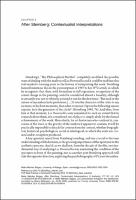Chapter After Steinberg: Contextualist Interpretations
| dc.contributor.author | Méndez Baiges, Maite | |
| dc.date.accessioned | 2022-12-22T16:07:51Z | |
| dc.date.available | 2022-12-22T16:07:51Z | |
| dc.date.issued | 2022 | |
| dc.identifier | ONIX_20221222_9788855186568_90 | |
| dc.identifier.issn | 2704-5919 | |
| dc.identifier.uri | https://library.oapen.org/handle/20.500.12657/60428 | |
| dc.description.abstract | Steinberg marked a gamechanger in the understanding of Les Demoiselles d'Avignon. The arguments with which Steinberg fought the limits of the formalist critics appear to have become unchallengeable from the 1960s on, the moment that Art History began to undergo a colossal transformation. Steinberg opened the doors wide to new critical focus on Modern Art. Among the doors he opened, were the biographical and psychological considerations about Les Demoiselles. This chapter presents a brief summary of the psychobiographic and contextualist interpretations of the work, including one of the most important by William Rubin who saw Les Demoiselles as a reflection of Picasso's psychosexual problems and presented unpublished documentation that would be of vital importance for future criticism and historiography. | |
| dc.language | English | |
| dc.relation.ispartofseries | Studi e saggi | |
| dc.subject.classification | thema EDItEUR::A The Arts | en_US |
| dc.subject.other | Modernism | |
| dc.subject.other | Demoiselles d'Avignon | |
| dc.subject.other | William Rubin | |
| dc.subject.other | Art nègre | |
| dc.subject.other | Art & Psychoanalysis | |
| dc.title | Chapter After Steinberg: Contextualist Interpretations | |
| dc.type | chapter | |
| oapen.identifier.doi | 10.36253/978-88-5518-656-8.06 | |
| oapen.relation.isPublishedBy | bf65d21a-78e5-4ba2-983a-dbfa90962870 | |
| oapen.relation.isbn | 9788855186568 | |
| oapen.series.number | 242 | |
| oapen.pages | 18 | |
| oapen.place.publication | Florence |

